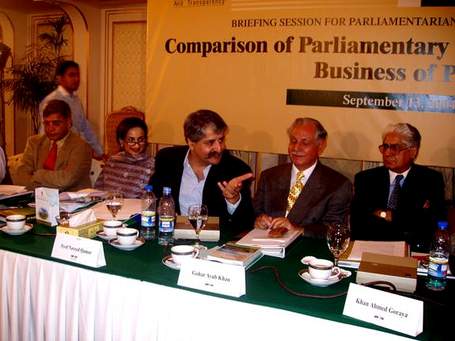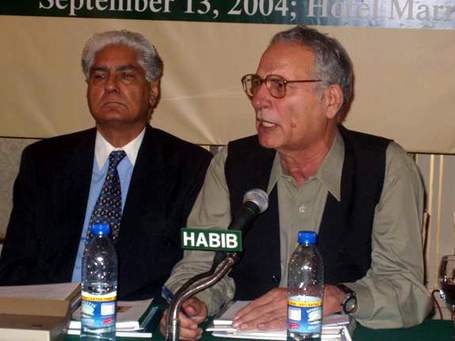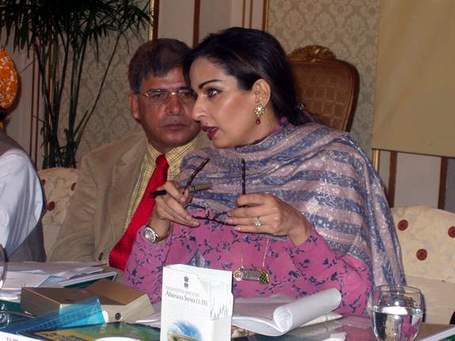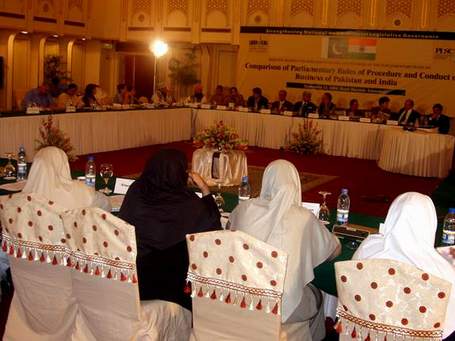|
|
| |
| EVENTS |
|
|
> Comparison of Parliamentary Rules of Procedure and Conduct of Business of Indian and Pakistani Parliaments
|
| |
|
Briefing Session for Parliamentarians
September 13, 2004
Hotel Marriott, Islamabad
Programme Details |
|
|
| |
The Rules of Procedure and Conduct of Business of the Indian Parliament are largely similar to those followed by Pakistani Parliament but the spirit and implementation and the traditions of these rules followed by Indian Parliament add special significance to them. These views were expressed by a Group of Parliamentarians who formed a Parliamentary Delegation to a Legislative Study Tour to India at the Briefing Session organised by PILDAT, as a part of PLSC, supported by the USAID. |
|
| |
The Speakers at the briefing, who were also delegates of the study tour which was also organised by PILDAT, as a part of PLSC, supported by the USAID, included Mr. Khan Ahmed Goraya, Former Secretary General of National Assembly; Mr. Gohar Ayub, Former Speaker of National Assembly; Syed Naveed Qamar, MNA; Ms. Sherry Rehman, MNA; Mr. M.P. Bhandara, MNA, Kanwar Khalid Younus, MNA and Maulana Ghafoor Haidry. Chaired by Mr. Sher Afgan Niazi, Federal Minister for Parliamentary Affairs, the Briefing Session mainly discussed major features of Indian Parliamentary System including Rules of Procedure and Conduct of Business; major features of Indian Election Commission and major features of Rules of Procedure of State Legislature of Punjab, India. The objectives of the briefing were to share best practises of the legislative tools that streamline Indian Parliamentary democracy and to strengthen the efforts of Pakistani legislators to review and suitably amend the existing rules of procedures of Pakistani Legislatures.
|
|
| |
Comparing the Parliamentary Rules of Procedure and Conduct of Business of the two countries, the speakers highlighted that the rules such as zero hour, parliamentary calendar and its strict adherence, increase in working hours of Parliament, to the exclusion of the practise of counting weekends into the overall limit of constitutional requirement of number of days of Parliament, should be introduced in the Parliament of Pakistan. In addition, the budgeting procedures of India need to be learnt from as it involves the standing committees in an effective manner into scrutinising the budget. The technology needs to be put to a better use to connect Parliament with public. A special Petitions Committee, patterned after India, is also the need of the day, through which public can demand attention of parliamentarians to important public issues. |
|
| |
Highlighting the differences in Indian and Pakistani election systems, Ms. Sherry Rehman, MNA, briefed parliamentarians that the strength of Indian Election Commission lies in its constitutional independence, objectivity and strict following of rules. In a detailed briefing, she emphasised that the Election Commission of India strictly follows the model code of conduct, agreed to by all parties in 1968, but which was actually implemented in 1991 as a major instrument of ensuring free elections. It has advanced technologically to an extent that instead of traditional ballot boxes India now uses the Electronic Voting Machines for elections. The writ of the independence of election commission is evident from the fact that it ensures a strict adherence of code of ethics for government party including requirements such as the government is not allowed to use govt. transport, vehicles, machinery or personnel unless express permission is granted by the EC; Ministers not allowed to combine official visits with electioneering; Public places are not to be monopolised, and other parties given the same rights over public resources; No Rest Houses, Dak Bungalows to be used as campaign offices and the advertisements cannot be charged to the public exchequer; misuse of official mass media to be scrupulously avoided; From the time Election Dates are announced, the party in power must not announce any financial grants or promise to the effect; lay foundation stones of public or civil projects; make any promise of providing facilities like drinking water, road construction, etc. ; make any ad-hoc appointment or changes in civil service and members of Govt. may not enter any polling station or booth except if candidates. |
|
| |
The speakers believed that the study tour was a well-structured programme of learning and it was a valuable exercise also to share it with fellow parliamentarians. Thanking the organisers, the speakers, alongside parliamentarians, felt that such structured study tours need to be undertaken in future to countries of the region that have valuable lessons to offer for strengthening parliamentary democracy in Pakistan. |
|
| |
|
|
| |
|
|
| |
|
|
| |
|
|
| |
|
|
| |

Syed Naveed Qamar, MNA (third from left) presenting his views at the briefing while Kanwr Khalid Younus, MNA (1st from left) Ms. Sherry Rehman, MNA (2nd from left), Mr. Gohar Ayub, Former Speaker National Assembly and Mr. Khan Ahmed Goraya, former Secretary General National Assembly |
|
| |
|
|
| |

(First Left to Right) Mr. Khan Ahmed Goraya and the Federal Minister for Parliamentary Affairs, Mr. Sher Afgan Niazi |
|
| |
|
|
| |

(From left to right) Kanwar Khalid Younus, MNA and Ms. Sherry Rehman, MNA |
|
| |
|
|
| |

|
|
|
|
|
|
|
|
|